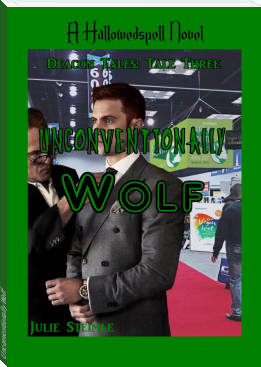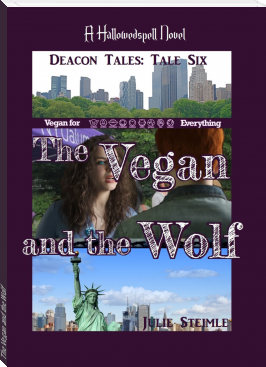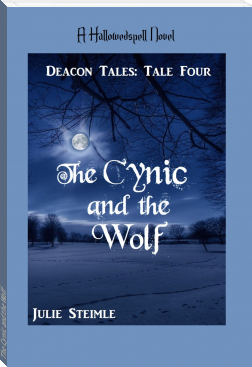Unconventionally Wolf by Julie Steimle (read 50 shades of grey TXT) 📕

Read free book «Unconventionally Wolf by Julie Steimle (read 50 shades of grey TXT) 📕» - read online or download for free at americanlibrarybooks.com
- Author: Julie Steimle
Read book online «Unconventionally Wolf by Julie Steimle (read 50 shades of grey TXT) 📕». Author - Julie Steimle
Chapter Seven
Breathless, Rick jogged into the small stage area where his presence had been requested for a panel—or rather his father’s presence had been requested. Rick was sure he was not the one the convention planners truly had wanted to show up.
He arrived barely in time.
“Finally!” The moderator clapped her hands together, gazing on him like an old schoolmarm chastening a little boy. She looked like she wanted to straighten out his clothes then give him a swat on his rear end to make him get a move on.
Carl set his eyes on him. He had been wringing his hands, sweat beading on his forehead and pacing for the past several minutes, especially after Rick had not come back to him with Tommy Whitefeather within the past hour.
“Where are Doug and Jim?” Rick looked around for his two bodyguards.
"Searching for you." Carl set about straightening up Rick’s suit, inspecting it for tears and stray threads. He even took out a comb and went through Rick’s hair.
“Do I really look that bad?” Rick laughed, pulling back.
“You look like you have been running a marathon,” Carl muttered, fixing Rick's tie.
“Does running from hunters count?” Rick asked while looking skyward.
Cringing, Carl apologetically nodded. “I am so sorry. I should have seen it earlier that it was a trap.”
“It’s ok,” Rick murmured, letting Carl fix his appearance. “I bumped into an old friend. He took care of me. And I actually got to meet with the Loup Garou Society. Uh, we haven’t come to an agreement yet, but I have a feeling we’ll have a talk again.”
“Later today?” Carl asked, combing Rick's sweat-damp hair back toward that perfect shape he once had that morning. Much of it had gone awry mostly from Rick stressing out during the hunt.
Rick shook his head.
“Hold still,” Carl snapped.
“Sorry. I just meant to say, ‘no’. We won’t be meeting again today,” Rick said. “They have to go back to Paris and talk with the, uh, elders of their society.”
Frowning, Carl gazed hard on him. “This Loup Garou Society sounds a little shady, if I may be so bold.”
Rick chuckled, nodding.
Shady. And yet what the French had said about the other pack, even though they did not know them… it had been spot on. It made Rick worry. Was his father fighting a lost cause? His time with the Wolverton pack had changed his world view. And when he had spent that time with Daisy under the full moon, he had felt a physiological change within him. He had been overwhelmed with passion for her. And he honestly had a hard time thinking about anything else but being with her since. He worried over that. Had he truly closed off any chance for a more substantial relationship beyond just the animal desires within him? Would he ever be able to have a more human relationship? Was there still a chance for him to start afresh and be free of his addiction? Or was lust all he would have connecting him to his future mate?
“Are you ok?” Carl asked. “You have that look in your eyes.”
“I don’t know if reading that paper would make a difference right now,” Rick murmured, feeling swallowed up in despair.
“Read it anyway,” Carl said.
Obeying, Rick took it out of his wallet.
“Get on the stage.” The moderator tugged on his arm, gesturing to the open spot.
Tucking back the list, Rick tripped first then walked the rest of the way. The applause was smattered with laughter when he stumbled onto the stage toward the table where the other three panelists where already sitting. The three panelists all appeared to be past their thirties. One was balding, but thankfully did not do the comb-over. He wore a suit coat over a tee shirt that had writing on it—sort of a statement that he was cool, but dignified enough to put that coat on. Another was dressed in a basic business suit with a blue tie. His hair was peppered with gray, but it was cut trim, as was his goatee. The last one wore khakis and a sloppy tee-shirt. He had longer hair which was pulled back into a man-bun. Sitting next to the eco-hippie, Rick looked and felt entirely out of place in his work-of-art suit.
The moderator stepped to the center of the stage in a casual suit, introducing them with the air of a mildly timid game show host. "Welcome everyone to Geo-Verdigris Con. The topic of this panel for the following hour is: Is manufacturing causing the end of the world? And how can big business counter the ecological damage it causes?"
Rick inwardly cringed. He knew he would be under attack since Deacon Enterprises was a manufacturer regardless that they contributed to wildlife reserves and often funded disaster cleanup crews. Once ecowarriors knew you produced something, you were under the tent of 'polluter'.
"Joining us on this panel is Professor David Benbrook Pederson, a professor at Yale's school of Forestry and Environmental Studies, Walter F. Fulcroft representative from the Sierra Club, Mr. Hadrian Lowell, CEO of Envirogain, and in place of his father—for Deacon Enterprises—Howard Richard Deacon the Third."
They received some polite applause, though clearly no one on the panel was of superstar status in the eco-green world. Rick's father would have been the draw, actually, if only for people to see a wealthy CEO of a company get taken down a notch. But with his eighteen-year-old son standing in, it somehow didn't seem quite as justified to destroy a wet-behind-the-ears kid.
"Now, let’s start with an audience question, which is based off our theme," the moderator said as she took a seat to the side. "How can big business counter the ecological damage it causes?"
Eyes, for some reason turned on Rick. Every one of the panelists held the same identical wry smirk, waiting for him to stutter and show his age.
Clearing his throat, Rick asked, "Is it correct to assume that every industry is causing ecological damage?"
"Well, the majority are guilty of producing an inordinate amount of waste into the ecosystem," chimed up the smirking Mr. Lowell, whose industry focused on making and selling recycled products.
"CO2 emissions alone," Mr. Fulcroft chimed in, grinning benevolently, "from the commute by itself is rather staggering."
"Isn't it true that your company’s contributions to 'rescuing the environment' as your PR department puts it, is just to mask the damage your industry is actually causing?" Prof. Pederson asked with that smug tone which Rick had always despised from adults growing up.
Peering back, Rick replied, "Not at all. My grandfather was dedicated to the preservation of wildlands as a matter of personal conviction. And we continue that for the same reason."
"And yet you keep open factories that produce CO2 emissions—"
"A main component in photosynthesis," Rick muttered.
"—and production waste." Prof. Pederson gazed on him with such condescension, it took all of Rick's strength not to glower at him. But he remained professional.
"Creating parks are just a way of pretending that you are not contributing to the problem," Mr. Lowell cut in. "A way of easing your conscience."
"The real question is," asked Mr. Fulcroft with a judgmental eye, "What's the bottom line? No matter how much you give back to the environment, what is the profit you are making?"
Rick stared at him sharply. "What does profit have to do with it? Manufacturing creates jobs for human beings and product, which pushes the economy forward."
They seemed to laugh at that response, like they believed he was truly naive.
"The excesses of manufacturing fills the world with toxins and reduces biodiversity around the world," Mr. Fulcroft explained as if he were teaching a kid at junior high. "Deacon Enterprises has to answer for two million in damages to—"
"Prove we are doing two million in damages to the environment," Rick bit back. "Fact is, you are just throwing out numbers and making assumptions without any real data to back it up."
Mr. Fulcroft drew in a breath, mildly surprised Rick had a solid comeback to that. Because of course there was no such proof. And there never would be. Circumspect was the key word Mr. Deacon used when talking about all behavior. They must be circumspect so hunters of all shapes and forms could not attack them—be they armed with cross bows or legal suits.
"Our factories undergo OSHA and EPA audits all the time," Rick said. We already have social accountability. But what you seem to be aiming for is shutting down all manufacturing entirely. Society cannot afford that, not unless you want to go back to the Stone Ages."
That got a few cheers and boos from the crowd.
The panelists at the table chose another tack, realizing that Rick did know a thing or two about the family business. That suit really hadn't been just a decoration to make a scared college kid look good, but the uniform of a future CEO.
"I think the real issue is: do we allow business to self-regulate?" said Prof. Pederson.
"In an ideal world—yes. But that doesn’t really work in reality," Mr. Lowell responded before Rick could put in even a semblance of a reply.
Mr. Fulcroft nodded. "Indeed. Most businesses would try to cut corners, attempt to hide their wasteful practices."
"But there are successful companies out there that have made an impact," Mr. Lowell interjected. "Take Siemens, for example. They are the most energy efficient company out there. They have produced the lowest carbon footprint, and better, they have one of the lowest employee turnovers."
They talked over and ignored Rick who was about to interject that Deacon Enterprises had updated most of their factories to the point that their carbon footprint was actually one of the lowest out there. As for their company turnover—except for that incident in Alabama, they had some of the most loyal employees that could be had. Of course, the loyalty of their employees was exactly why the Deacons were such generous employers. They needed it. And Howard the First had learned long ago that if he treated his employees well, it came back as a shield for him when hunters came around.
They purposely kept Rick out of the conversation. As they did, the three panelists talked more in terms of harmony. Saying things like: "Is there an acceptable amount of loss during manufacturing? Or is it all unacceptable?" One man argued that they must shift industry to something entirely in harmony with nature. While another interjected that to destroy biodiversity is to destroy the earth.
Rick interjected once that they were being overly dramatic, but that was ignored. Around that moment, Rick smelled it. That familiar odor of wolfsbane which either made him cough from the odor, want to vomit—or in extreme cases caused anaphylactic shock. His eyes were already watering, and he had begun to cough.
While Mr. Fulcroft chuckled over whether it was wise to worry too much about things such as "blind tree frogs in South America", and Mr. Lowell bickered back that it could be that blind tree frog that tips the scale and sends us down the path of no return, Rick was finding it difficult to breathe. A garlicky smell





Comments (0)